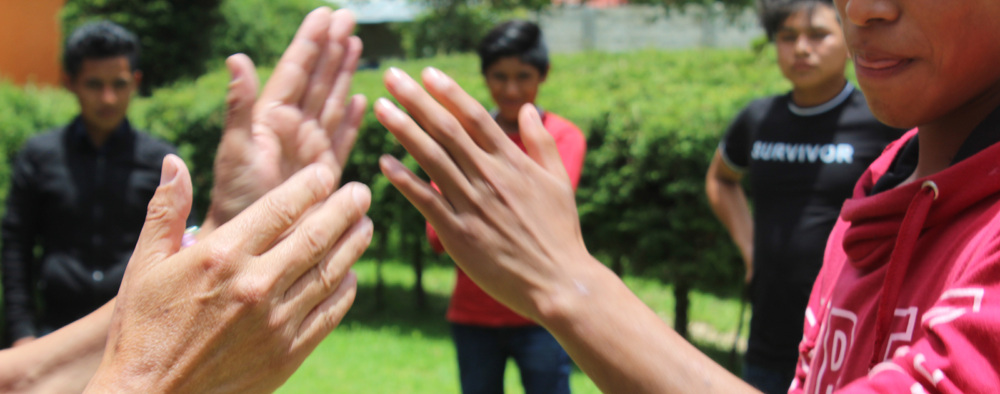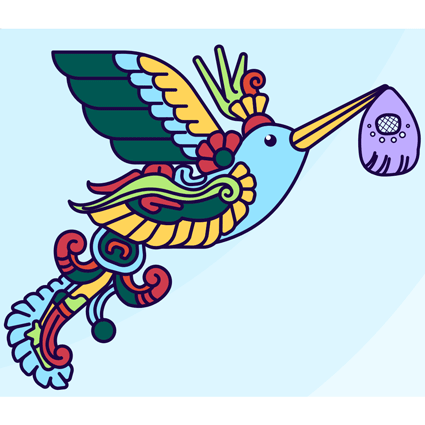
Justiça de gênero
Justiça de gênero, Segurança e bem-estar, Poder da juventude
Nota do editor: esta postagem, que também é disponível em espanhol, foi co-escrito por Diego López Aguilar e pelo oficial de programa do GFC, Rodrigo Barraza.
Meu nome é Diego López Aguilar. Tenho 25 anos e moro em uma comunidade chamada Chiloljá, no Planalto de Chiapas. Falo uma língua indígena chamada tzeltal. Sou o mais velho de três irmãos. Todos homens.
Minha mãe morreu quando eu tinha seis anos. Essa ainda é uma das lembranças mais dolorosas da minha vida. Dói porque não me lembro mais dela; eu costumava me lembrar de um pouquinho, mas agora tudo está borrado. Não consigo mais ver o rosto dela. Eu sonhava com ela, mas tudo se foi. Mas eu sei que ela ainda está me procurando. Em algum lugar.
Após a morte da minha mãe, meu pai se casou novamente. Sua nova esposa odiava a mim e aos meus irmãos mais novos. Sendo muito pequenos, éramos obrigados a acordar muito cedo e caminhar muitos quilômetros para buscar água, moer milho... e se não conseguíssemos, não podíamos comer. Meu pai também me batia e me insultava. Eu me sentia solitário, sem família. Sentia muita falta da minha mãe. Eu estava sempre chorando.
Uma vez meu pai me bateu tão forte que fugi para morar com meus avós. Sinto que minha vida começou ali. Foi como renascer. Eu tinha sete anos.
Devo tudo aos meus avós, porque eles me ensinaram a trabalhar, a amar minha família, a ter orgulho da minha cultura e de quem eu sou.
Meu avô queria que eu vivesse na comunidade e aprendesse a semear e cultivar alimentos, mas ele também me disse: Diego, você tem que estudar, só assim você poderá trazer coisas boas para sua família e sua comunidade. Se você estudar, você será livre. É para isso que serve a escola: para que você saiba quem você é e sonhe com onde quer chegar..
[image_caption caption=”Diego e seu avô na assembleia anual da Coalizão de Migrantes Indígenas de Chiapas.” float=””]
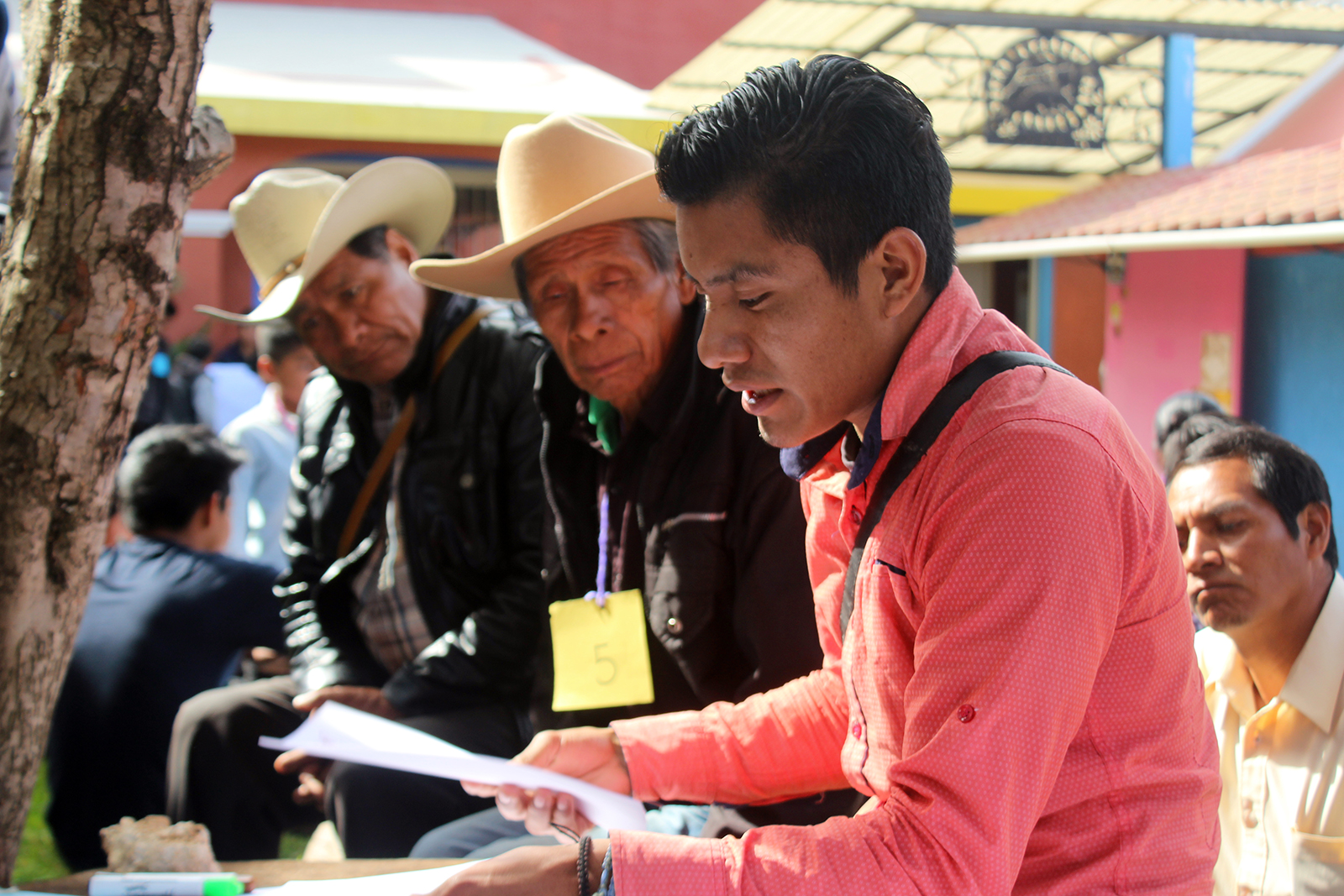
[/imagem_legenda]
Eu queria trabalhar em outro lugar. Queria migrar para ajudar minha família, mas meu avô não me deixou. Ele sempre me disse que o mais importante era estarmos juntos como família e apoiar uns aos outros. O pouco que temos é para todos desta família, ele me disse.
Ele me ensinou a plantar feijão e milho, a cultivar café. Minha avó também me ensinou muito. Ela me ensinou que ser homem é cuidar da família, ser honesto e respeitar as mulheres. Aqui todos somos iguais e contribuímos da mesma forma Diego, não se esqueça, minha avó costumava dizer.
Quando completei 18 anos, fugi e fui para a cidade de San Cristóbal de las Casas trabalhar em um bar. Eu ganhava muito pouco e trabalhava muitas horas, até passar da meia-noite. Fiquei triste e senti que tinha decepcionado minha família. Certa vez, alguns homens me espancaram e levaram todo o meu dinheiro, e então me lembrei do meu avô me incentivando a ficar na minha comunidade. Eu podia ouvi-lo me dizendo: Volte para onde você pertence, Diego. Voltei para Chiloljá e renasci novamente. Só por estar com o meu povo.
[image_caption caption=”Tia e avó de Diego participando de uma oficina comunitária.” float=””]
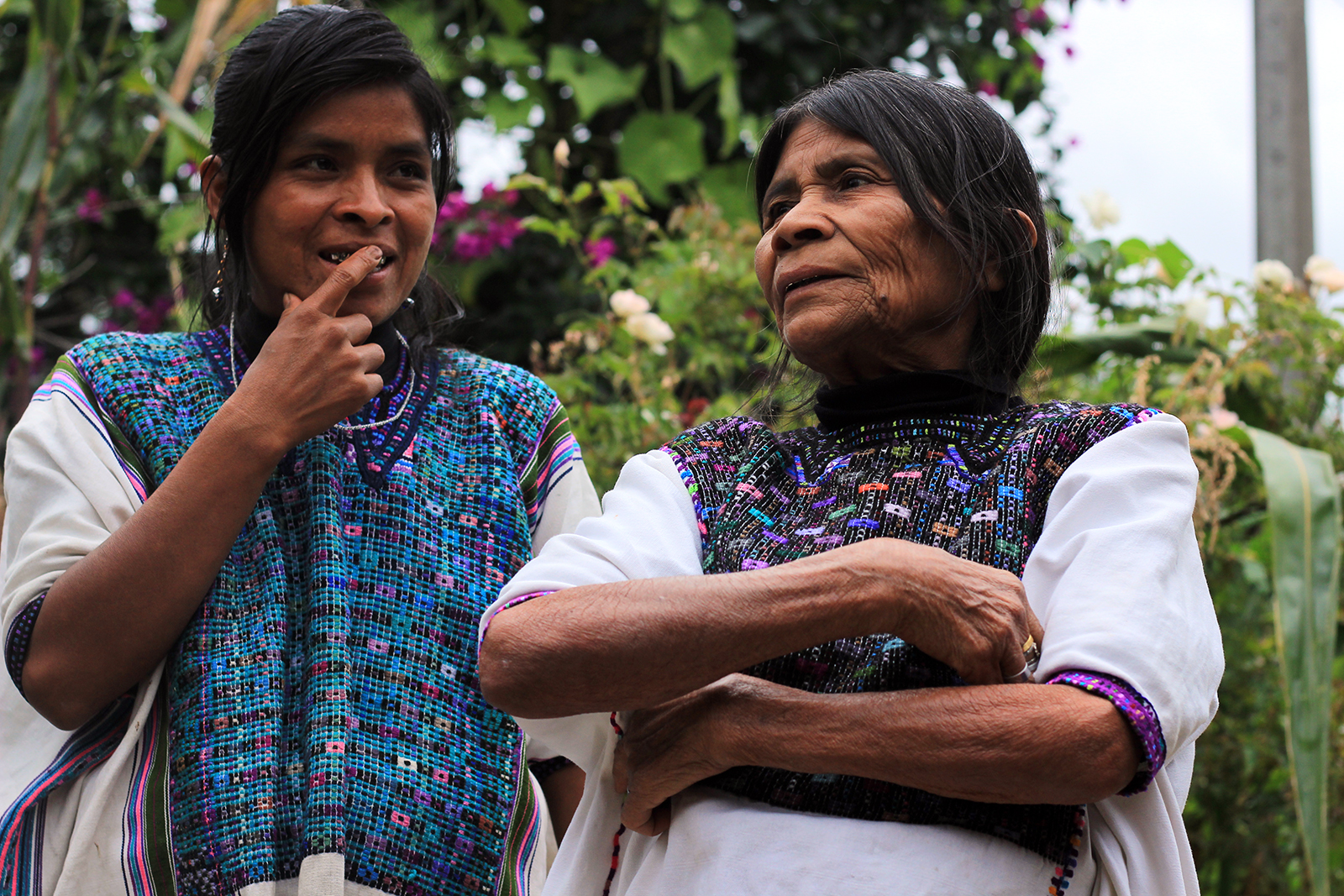
[/imagem_legenda]
Um dia, enquanto eu trabalhava na fazenda da minha família, um amigo se aproximou de mim e me convidou para estudar na Universidade de San Cristóbal de las Casas. Ele me disse que havia bolsas de estudo para estudantes indígenas. Que ele poderia me ajudar. No começo, eu disse que não, estava com muito medo porque isso significava voltar para a cidade e eu não falava espanhol. Mas meu avô e minha família insistiram. Então, eu os deixei novamente. Mas desta vez foi diferente, porque eu sabia que estava fazendo isso por eles também..
O primeiro ano foi muito difícil, mas meus professores me trataram muito bem – eles me deixaram me expressar na minha língua e me incentivaram a continuar. Certa vez, eu estava prestes a desistir, e um professor me interrompeu e disse: Diego, as pessoas sempre tomam decisões por medo ou por amor. Você precisa ter certeza de que é sempre o amor, e não o medo, que guia suas decisões.. E decidi continuar, pela minha família, para que eles se sentissem orgulhosos de mim.
[image_caption caption=”Diego em um workshop recente sobre gênero e masculinidades, liderado pela GFC. Os participantes refletiram sobre quem os ensinou a ser homens e, em seguida, identificaram duas atitudes que desejam cultivar e duas atitudes que desejam mudar.” float=””]
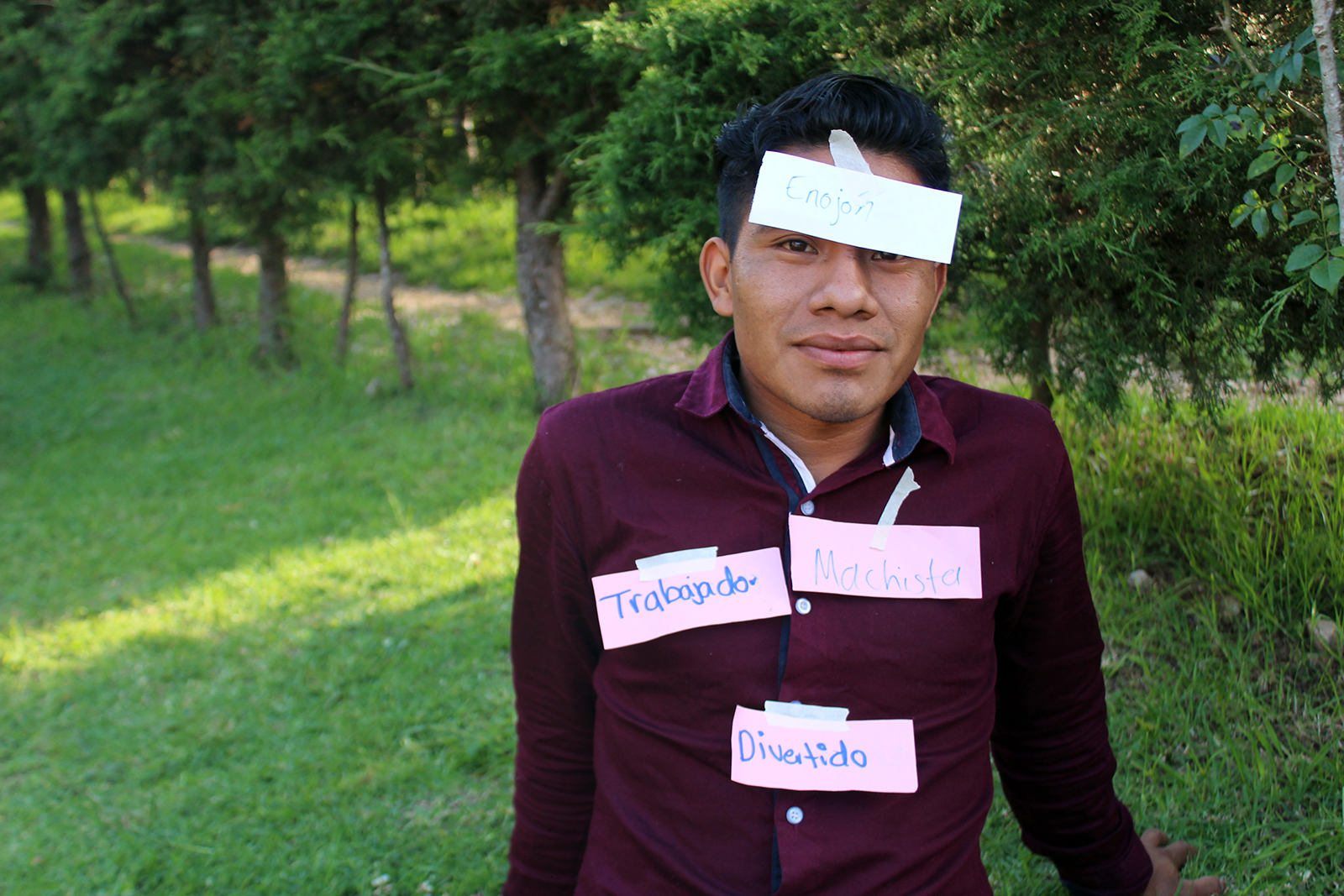
[/imagem_legenda]
Nos anos seguintes, aprendi muito, agora também consigo me comunicar em espanhol. Encontrei novas maneiras de semear e cuidar das plantas. E conheci organizações incríveis que lutam pela Lekil Kuxlejal, a boa vida das famílias e comunidades indígenas. Como a Coalizão de Migrantes Indígenas de Chiapas (CIMICH).
Mais uma vez eu renasci. O trabalho deles me inspirou e eu queria me envolver.
Disseram-me que, para fazer parte do CIMICH, é preciso organizar-se com a família e a comunidade e elaborar projetos de economia social, como pomares comunitários ou apicultura. Além disso, tive de receber formação em temas como direitos humanos, migração e género. Somos uma família e todos nos apoiamos, me disseram. Como meu avô.
Faço parte do Conselho Diretor do CIMICH há três anos. E às vezes tenho dificuldade em acreditar em tudo o que conquistei.
No início, as pessoas da minha comunidade zombavam de mim, dizendo que eu estava apenas perdendo meu tempo. Mas, como sempre, minha família acreditou em mim. Nosso grupo se chama "Família Aguilar" e agora criamos coelhos, produzimos fertilizante orgânico e vendemos café. Estamos unidos.
Agora comecei a trabalhar com um grupo de crianças da minha comunidade para falar sobre gênero e o direito de migrar. Pintamos, dançamos, fazemos peças teatrais e confiamos nos nossos sonhos. E com meus colegas do CIMICH, iniciei um processo para criticar nosso machismo e construir masculinidades saudáveis.
E é uma das coisas que mais gosto de compartilhar com as crianças: que existem outras maneiras de ser homem. Que também podemos chorar, abraçar, pedir ajuda e expressar nossos sentimentos. Que temos privilégios que causam dor aos outros e que não podemos ser livres se nos limitarmos ou limitarmos os outros apenas por causa do nosso sexo.
Muitas vezes eu morri. E todas as vezes eu renasciGraças ao apoio da minha família, às palavras de esperança dos meus amigos, professores e colegas de classe. Eles nunca me deixaram desistir do meu sonho. Sempre houve alguém que me disse: vale a pena sonhar.
E agora é isso que eu quero, poder contar para mais e mais crianças e jovens Vale a pena sonhar, e você não precisa sonhar sozinho. Somos uma família e nos apoiamos mutuamente.. Como meu avô costumava dizer. Espero que ele se orgulhe de mim.
A Coalizão de Migrantes Indígenas de Chiapas (CIMICH) foi legalmente constituída em setembro de 2013 como uma Associação Civil (AC). A Coalizão representa um passo importante para as comunidades indígenas de Chiapas em seus processos de construção de uma vida digna e de uma migração positiva em seus territórios. Atualmente, é composta por 25 grupos, com 250 participantes, localizados em municípios de Los Altos.
Em 2019, aproximadamente 25 meninos e jovens de diferentes comunidades de Chiapas iniciaram um processo para identificar a violência sexista em suas vidas e gerar novas práticas de confiança e apoio entre os homens. O próximo passo será formar jovens promotores de masculinidades saudáveis em suas famílias e comunidades.
O CIMICH atua como braço comunitário da Voces Mesoamericanas Acción con Pueblos Migrantes AC (Ação das Vozes Mesoamericanas com Povos Migrantes), uma parceira do Fundo Global para Crianças no México que faz parte do programa GFC. Iniciativa de Meninas Adolescentes Migrantes.
